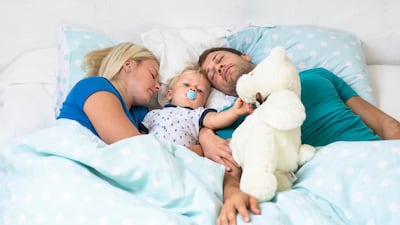They say mums should get their shut-eye when their newborns are napping, but it doesn’t quite work out like that, does it? Sleep deprivation is part and parcel of parenthood, and most new mums and dads resign themselves to the fact that their eight hours a night are but a distant dream. Well, it turns out the word "distant" is more crucial in this than previously thought.
A recent report, published in the Sleep journal, claims that not only do sleep patterns hit rock bottom in the first three months after a child is born, but also the quality of shut-eye parents get is not quite as high-quality as before. And that can last for up to six years.
Unsurprisingly, both these outcomes were more prevalent in women, according to the seven-year study, which interviewed almost 5,000 parents in Germany.
The researchers, from the University of Warwick and the German Institute for Economic Research, found that birth mothers sleep one hour less than before they were pregnant in the first three months and 40 minutes less over the course of the first year, while the sleep duration for fathers decreased by about 15 minutes. The duration remains the same for dads until the child is between 4 and 6 years, while mums get up to 20 minutes less sleep at this stage.
First-time parents reported being less satisfied with their sleep quality, compared to more experienced peers, and the team also found that the impact of the first child lasted longer for both parents. Dr Sakari Lemola, co-author of the study, says this is likely due to the continuing impact of the first child – so “your baseline is lower” to start with.
Tips to sleep better
Sleep may well be the ultimate luxury. So here are a few top tips to getting your forty winks.
Turn to technology: from self-adjusting mattresses and tracking pillows to soothing eye masks and noise-cancellation devices, there is a range of gadgets that aim to promote a more restful slumber.
Turn away from technology: we're reluctant to turn off our smartphones and tablets even in the bedroom. LED-backlit screens reduce melatonin secretion (the hormone that regulates sleep patterns), alertness and cognitive performance. Essentially, your gadgets are keeping your brain awake, even if you don't realise it. So banish your devices to another room; they'll still be there in the morning.
Food for thought: sleep-inducing snacks include: cherries, which are a natural source of melatonin; milk and bananas, which encourage muscle relaxation; unsalted almonds and turkey, which are rich in stress-reducing tryptophan.
Consider broader lifestyle changes: "Two good ones to start with include avoiding caffeine and sticking to a regular sleep schedule," suggests Dr Hadine Joffe, an associate professor of psychiatry at Harvard Medical School. "It is better to exercise in the morning because the natural light helps the body wake up," adds Dr Khaldoun Mozahem, a neurological consultant and sleep specialist at the American Center for Psychiatry and Neurology in Abu Dhabi. "If you exercise late at night, it can be stimulating and stop you from being sleepy."


